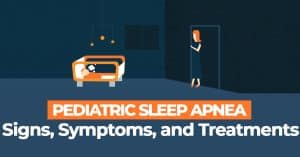As parents, ensuring your child gets a good night’s sleep is more than just about avoiding cranky mornings. Sleep is a cornerstone of child growth and development. However, if your child snores, breathes through their mouth, or has restless nights, they might be struggling with pediatric sleep apnea—a condition that, if left untreated, can have serious and lasting effects on their health, growth, and overall quality of life.
Lets discuss how to recognize the signs of sleep apnea in children and why early intervention is vital, and what you can do to help your child thrive.
Treating the Root Cause of Pediatric Sleep Apnea
Dr. Adams has many options to correct pediatric sleep apnea by addressing the root cause of the airway problem. Our treatments do not involve surgery (removing tonsils and adenoids) and band aid devices such as CPAP. Our solutions involve orthodontic expanders that slowly expand the mouth and jaw spaces to allow more room for proper breathing and sleep.
What Is Pediatric Sleep Apnea?
Pediatric sleep apnea occurs when your child’s airway becomes partially or fully blocked during sleep. These blockages disrupt their breathing, reducing oxygen levels and preventing the deep, restorative sleep their growing bodies and brains need. Unlike adults, children with sleep apnea may not always appear excessively tired; instead, they may exhibit behavioral or developmental challenges. Effective pediatric sleep apnea treatment can save your child from lifelong health risks.
Why Treating Pediatric Sleep Apnea Is So Important
Sleep apnea in children doesn’t just affect their rest—it can have a profound impact on their health and development:
- Impaired Growth: Sleep is when the body releases the majority of growth hormones. Interrupted sleep from apnea can stifle physical growth, leading to delays or issues with height and weight.
- Cognitive Challenges: Poor sleep can lead to difficulty concentrating, memory problems, and lower academic performance.
- Behavioral Issues: Children with sleep apnea often display symptoms of hyperactivity, irritability, or mood swings, which are sometimes mistaken for ADHD.
- Facial and Jaw Development: Chronic mouth breathing or airway obstruction can alter jaw and facial structure, leading to orthodontic problems and even long-term changes in appearance.
- Lifelong Health Risks: Untreated pediatric sleep apnea can set the stage for future health issues, including high blood pressure, heart problems, and metabolic disorders.
The sooner you address these issues, the better your child’s chances of reversing these effects and achieving lifelong health and well-being.
How to Recognize the Signs of Pediatric Sleep Apnea
Early diagnosis of pediatric sleep apnea starts with recognizing the symptoms. Here’s what to watch for:
Signs During Sleep
- Persistent snoring or noisy breathing
- Bed wetting
- Gasping or choking sounds
- Teeth clenching
- Restless tossing and turning
- Frequent waking
Signs During the Day
- Mouth breathing, even when awake
- Chronic fatigue, irritability, or mood swings
- Difficulty focusing or symptoms resembling ADHD
- Poor appetite or challenges with growth and weight gain
- Picky eater
If your child exhibits these symptoms, don’t wait—consult a specialist. Early intervention can prevent long-term consequences and support your child’s optimal development.
How to Correct Mouth Breathing and Snoring Habits
At The TMJ Sleep and Breathe Center, we focus on non-invasive, holistic treatments that address the root causes of pediatric sleep apnea. Here are the key approaches we use:

Myofunctional Therapy
Myofunctional therapy involves guided exercises to strengthen the muscles of the tongue, lips, and throat, encouraging proper oral posture and nasal breathing.
Benefits include:
- Retraining the tongue to rest against the roof of the mouth
- Opening up the airway for better breathing
- Correcting harmful habits like mouth breathing
Palatal Expanders
A narrow palate can restrict the airway, making it harder to breathe. Palatal expanders gently widen the upper jaw, creating more space for the airway.
Benefits include:
- Enhanced airflow and oxygenation
- Improved sleep quality
- Proper alignment of teeth and jaw
Tongue-Tie Release
A tongue-tie restricts the tongue’s movement, which can lead to poor oral posture and airway obstruction. A simple procedure to release the tongue allows for better function and breathing.
Benefits include:
- Improved airway function
- Enhanced outcomes when combined with myofunctional therapy
- Prevention of future orthodontic issues
Tongue tie release procedure is an easy procedure that can be done in the dental office using a CO2 laser such as the Lightscalpel.
How Parents Can Help at Home
In addition to professional treatment, you can support your child’s airway health with these tips:
- Encourage nasal breathing during the day.
- Address nasal congestion with saline sprays or other remedies.
- Practice breathing exercises as a family to promote healthy habits.
The Long-Term Impact of Treating Pediatric Sleep Apnea
Treating sleep apnea early doesn’t just improve your child’s sleep—it transforms their entire life. Proper treatment ensures they get the oxygen and restorative rest their growing bodies need, setting the stage for:
- Healthy physical growth
- Improved learning and cognitive function
- Reduced behavioral challenges
- Lifelong health and well-being
Without treatment, the consequences of sleep apnea can persist into adulthood, leading to chronic health issues and reduced quality of life. As a parent, taking action now is one of the best ways to safeguard your child’s future.
Take the First Step Today
If you suspect your child has sleep apnea, don’t ignore the signs. At The TMJ Sleep and Breathe Center we specialize in diagnosing and treating pediatric sleep apnea with gentle, non-invasive methods that promote healthy breathing, restful sleep, and proper development.
Contact us today to schedule an evaluation and help your child get back on the path to healthy sleep and a brighter future.
With early intervention and the right care, your child can breathe easier, sleep soundly, and grow into their happiest, healthiest self.
